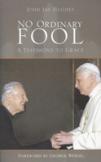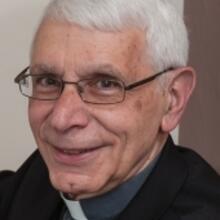All He Ever Wanted
In his most affective and affecting epistle, St. Paul wrote to the Philippians: “I give thanks to my God for all my memories of you” (Phil 1:3). Paul’s eucharistic remembering came repeatedly to mind while reading the Rev. John Jay Hughes’s lovely and moving autobiography, No Ordinary Fool. Calling to mind and narrating the events of his life—the sorrow of his mother’s death when he was but six years old, the emotional and spiritual closeness to his Anglican priest father, his own ordination to the priesthood as an Episcopalian and subsequent reception into the full communion of the Catholic Church, his painful alienation from his beloved father, his fruitful scholarly and pastoral ministry—all this and more Hughes celebrates as a testimony to grace.
As a precocious and sensitive child, the loss of his mother at so early an age had and continues to have an indelible impact. He says simply: “From this blow I have never recovered. I belong today to the walking wounded.”
Yet, from this unfathomable sorrow there came a conviction of grace. Let me allow Hughes to recount the decisive occurrence in his own voice:
I can no longer recall the exact day when I discovered God in the darkness. I can fix it, however, before the age of nine. One day I realized the parting was not forever. With blinding certainty it came home to me that I would see my mother again, when God called me home. From that day to this the unseen spiritual world—the world of God, of the angels, of the saints, and of our beloved dead—has been real to me.... Decades later I realized that this insight was the beginning of my priestly vocation.
Hughes spent six happy years as a priest in the Anglican Communion, mostly in parish ministry. Four aspects of that priestly service continue to characterize his approach to priestly ministry to this day. They have relevance not only for priests, but for all those seeking to respond generously to the Lord’s call.
First, early in his ministry he made a commitment to tithe whatever income he received. To his surprise he found the practice of tithing not a burden, but a source of blessing. He writes: “Since it is based on faith (trusting that our needs will be taken care of if we give away the first portion of our income), it deepens faith. It enables us to use money sacramentally, by making something material a vehicle of the spiritual—gratitude.”
Second, Hughes soon became convinced of the need for a sustained prayer life as the soil of fruitful ministry and, indeed, of all growth in Christ. Moreover, this discipline must be practiced in season and out of season, whatever feelings of consolation or desolation accompany one’s prayer. As he writes wisely: “Neglect of this fundamental truth is the root cause of much of the Church’s present difficulties.”
Third, from teenage years the practice of confession has been crucial to his spiritual life. Indeed, one of the sorrows he experienced in becoming Roman Catholic before the Second Vatican Council was that he did not hear pronounced the consoling words of absolution, which he had heard and rejoiced in as an Episcopalian. Instead, Catholics before the council were instructed to pray the Act of Contrition while the priest mumbled absolution in Latin. The irony, of course, is that the linguistic intelligibility of the sacrament has also witnessed a decline in its celebration—though there are welcome signs of a rediscovery of this great grace.
Finally, a practice that Hughes learned from his Anglican mentors and which he has followed faithfully is never to preach on Sunday without a written text before him. The obvious advantage is that one thereby disciplines oneself to a clear beginning, middle and ending to structuring the interconnections among them. Those who have read Father Hughes’s published homilies know the care and the imagination they exhibit. He tells us that in homilies he shuns “moralism.” He explains that even when preaching the moral law, he presents it “not as the standard we must meet before God would love and bless us, but rather as the description of our grateful response to the blessings and love bestowed upon us by our loving heavenly Father as a free gift.”
Father Hughes writes with passion and conviction, spicing his recollections with telling incidents and wry humor, often enough directing his wit at his own false steps and follies. But it is the author’s Jacob-like wrestling with the call to Catholicism that provides the distinctive drama of the narrative.
In his early 20s he began to wonder whether the Anglican tradition had not in fact splintered itself from the Catholic Church, a questioning that his high-church father dismissed as “Roman fever.” Resolved for a time, the questions re-emerged forcefully after his ordination as an Episcopal priest. The stumbling block was his suspicion of exaggerated papal claims. But as he studied and consulted about them, he found them less an obstacle than he had feared.
The decision, in 1960, to enter into full communion with the Catholic Church was motivated by no emotional appeal or aesthetic attraction to the preconciliar church, but solely by his persuasion of the truth of its claim. In his view this entailed no repudiation of his past nor of the abundant graces he had received. As he wrote his father at the time, “It was not so much that I had come to find Anglicanism wrong, as incomplete.” But all efforts at explanation were spurned; the elder Hughes barred his son from the family home; and, though correspondence continued between them, they never saw each other again.
Hughes’s subsequent studies in Innsbruck (where he attended the lectures of Karl Rahner, S.J.) and in Münster (where he heard and greatly appreciated Joseph Ratzinger) were followed by his conditional ordination as a Catholic priest. His account of his many years of priestly ministry in the postconciliar church as teacher, theologian and pastor will elicit respect, gratitude and frequent moments of recognition as readers recall their own experiences and enter (as I did) into silent, yet spirited conversation with the author.
One will find much to relish and to learn from in this marvelous testimony to grace. Eucharistic remembering provides the cantus firmus that inspires and sustains Hughes’s honest and joyful witness. His book evokes, in an almost sacramental way, what St. Paul saw to be the fruit of grace: “an overflow of thanksgiving to the glory of God.”
This article also appeared in print, under the headline “All He Ever Wanted,” in the October 6, 2008, issue.








